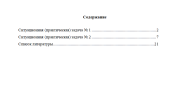Английский язык. Вариант 10. НГУЭУ
Уважаемые студенты!
Уже более 10 лет мы оказываем помощь в обучении.
За это время нами накоплен колоссальный опыт и большое количество систематизированного учебного материала,...
| Компания: | В ПОМОЩЬ СТУДЕНТУ |
| Артикул: | 0205 |
| Цена: | 300 руб. |
| Город: | Новосибирск, Новосибирская область |
| Категория: | Другое |
Задание 1. Прочитайте и переведите текст
Types of Business Manufacturing firms produce a wide range of products. Large manufacturers include producers of airplanes, cars, computers, and furniture. Many manufacturing firms construct only parts rather than complete, finished products. These suppliers are usually smaller manufacturing firms, which supply parts and components to larger firms. The larger firms then assemble final products for market to consumers. The advantage that large businesses have in being able to efficiently and inexpensively control any parts of a production process is known as economies of scale. But small manufacturing firms may work best for producing certain types of finished products. Smaller end-product firms are common in the food industry and among artisan trades such as custom cabinetry. Merchandisers are businesses that help move goods through a channel of distribution—that is, the route goods take in reaching the consumer. Merchandisers may be involved in wholesaling or retailing, or sometimes both. A wholesaler is a merchandiser who purchases goods and then sells them to buyers, typically retailers, for the purpose of resale. A retailer is a merchandiser who sells goods to consumers. A wholesaler often purchases products in large quantities and then sells smaller quantities of each product to retailers who are unable to either buy or stock large amounts of the product, benefiting from economies of scale. The division between retailing and wholesaling is now being blurred by new technologies that allow retailing to become an economy of scale. Telephone and computer communications allow retailers to serve far greater numbers of customers in a given span of time than is possible in face-to-face interactions between a consumer and a retail salesperson. Computer networks such as the Internet allow a nearly unlimited capacity for sales interactions known as 24/7. Computer technology also provides retailers with another economy of scale through the ability to sell goods without opening any physical stores, often referred to as electronic commerce or e- 28 commerce. Service enterprises include many kinds of businesses. Examples include dry cleaners, shoe repair stores, barbershops, restaurants, ski resorts, hospitals, and hotels. In many cases service enterprises are moderately small because they do not have mechanized services and limit service to only as many individuals as they can accommodate at one time. In recent years the number of service enterprises in wealthier free-market economies has grown rapidly, and spending on services now accounts for a significant percentage of all spending. Wealthier nations have developed postindustrial economies, where entertainment and recreation businesses have become more important than most raw material extraction such as the mining of mineral ores and some manufacturing industries in terms of creating jobs and stimulating economic growth.
Задание 2. Ответьте на вопросы к тексту письменно
Вопросы:
1. What products are made by large manufacturers?
2. In what areas are smaller producers more efficient?
3. What is wholesaling?
4. Why is division between retailing and wholesaling disappearing?
5. What is meant by post-industrial economy?
Задание 3. Составьте 3 вопроса к тексту (письменно)
Список литературы
Товары и услуги компании
Похожие товары
Горячие предложения
.png)















